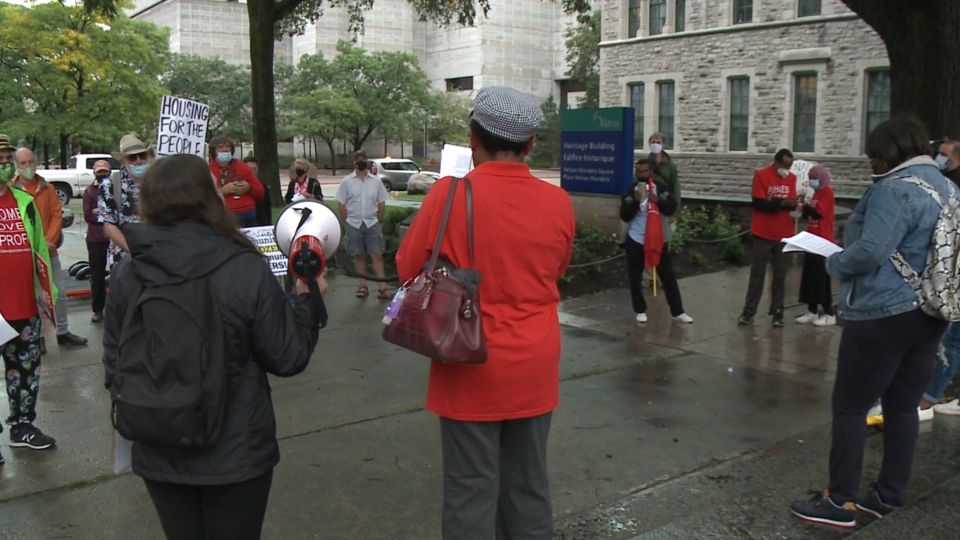CTV News: City approves Heron Gate redevelopment plan
Posted September 9, 2021
Posted September 9, 2021
 OTTAWA — After years of discussion, Ottawa city councillors voted to approve a plan to redevelop the Heron Gate neighbourhood.
OTTAWA — After years of discussion, Ottawa city councillors voted to approve a plan to redevelop the Heron Gate neighbourhood.
The plan includes a memorandum of understanding (MOU) with the developer, Hazelview, to ensure 1,020 affordable housing units for a period of between 15 and 20 years. It also includes $1 million for a new park and a maximum building height of 25 storeys.
The redevelopment is expected to take 20 to 25 years to complete.
Of the 1,020 affordable units, 510 are to be newly built and would be considered affordable housing for 15 years. If tenants do not move out after the 15-year limit, their rent would continue to be at an affordable level. The remaining 510 units are in existing buildings and would be considered affordable housing for 20 years.
The redevelopment of Heron Gate—one of the poorest and most racialized parts of Ottawa—began in 2016 when Hazelview, formerly known as Timbercreek, evicted hundreds of residents and demolished their former homes. The move generated international headlines at the time.
The company had said the units were beyond repair. Since then, tenants’ rights groups, such as ACORN, have been fighting for the residents who still live in the area.
During Wednesday’s city council meeting, councillors Shawn Menard and Catherine McKenney brought forward three motions that were aimed at increasing the amount of affordable housing, reducing the rents, and ensuring that tenants who are displaced move back into a new build of a similar size.
On the final note, staff noted that Hazelview has committed to a like-for-like transfer of tenants.
“If you’re a family that’s living in a three-bedroom townhouse and you’re going to be displaced as part of this construction process, you’ll be provided a three-bedroom townhouse. You won’t be displaced from your townhouse and put into an apartment,” said the city’s director of planning, Lee Ann Snedden.
The motions were voted down, with city staff saying that prolonging the discussions with Hazelview risks undermining the MOU.
“Hazelview has indicated that you can only take so much in terms of what they’re financially able to afford to provide,” Snedden said. “(Going) beyond this MOU, they’ve expressed, would be going past what they can afford to build here.”
The plan was approved by a vote of 18 to 6, with councillors Fleury, King, Menard, McKenney, Deans and Leiper voting against it.
‘Landmark’ deal on complicated file
Staff called the deal a “landmark” agreement, which could provide a blueprint for future deals with developers.
Speaking to reporters after the council meeting, Mayor Jim Watson said housing is a complex issue and the city has few tools for ensuring affordable housing is built.
“In an ideal world, we’d have more tools from the provincial government, including inclusive zoning, that would give us the ability to set benchmarks and goals and make sure those goals are achieved,” Watson said. “What we did over last four years with this particular project was, in fact, based on the good will of the company. They could have walked away and said they were not interested in providing any affordable housing. If we had greater tools from the provincial government, inclusionary zoning being the most obvious one, I think we could do much more partnership with the private sector.”
A protest was held outside city hall Wednesday morning, with residents and tenant groups opposed to the plan that was ultimately passed.
Watson said, when speaking to reporters, that the city secured more affordable housing than ever before with the agreement with Hazelview.
“The message I have to the residents, and future residents of that part of the city, is that today we secured a deal that has been described as a ‘landmark’ deal by those involved in the drafting of it that will allow more people to live in more affordable housing in one particular community than we’ve been able to negotiate in the past,” he said. “Would we like to see more than 1000 (affordable housing units)? Of course. Would we like to see deeper discounts in the rent? Of course, but the company was not required to do any of what we asked them to do in the social contract.”
***
Article by Ted Raymond for CTV News Ottawa

